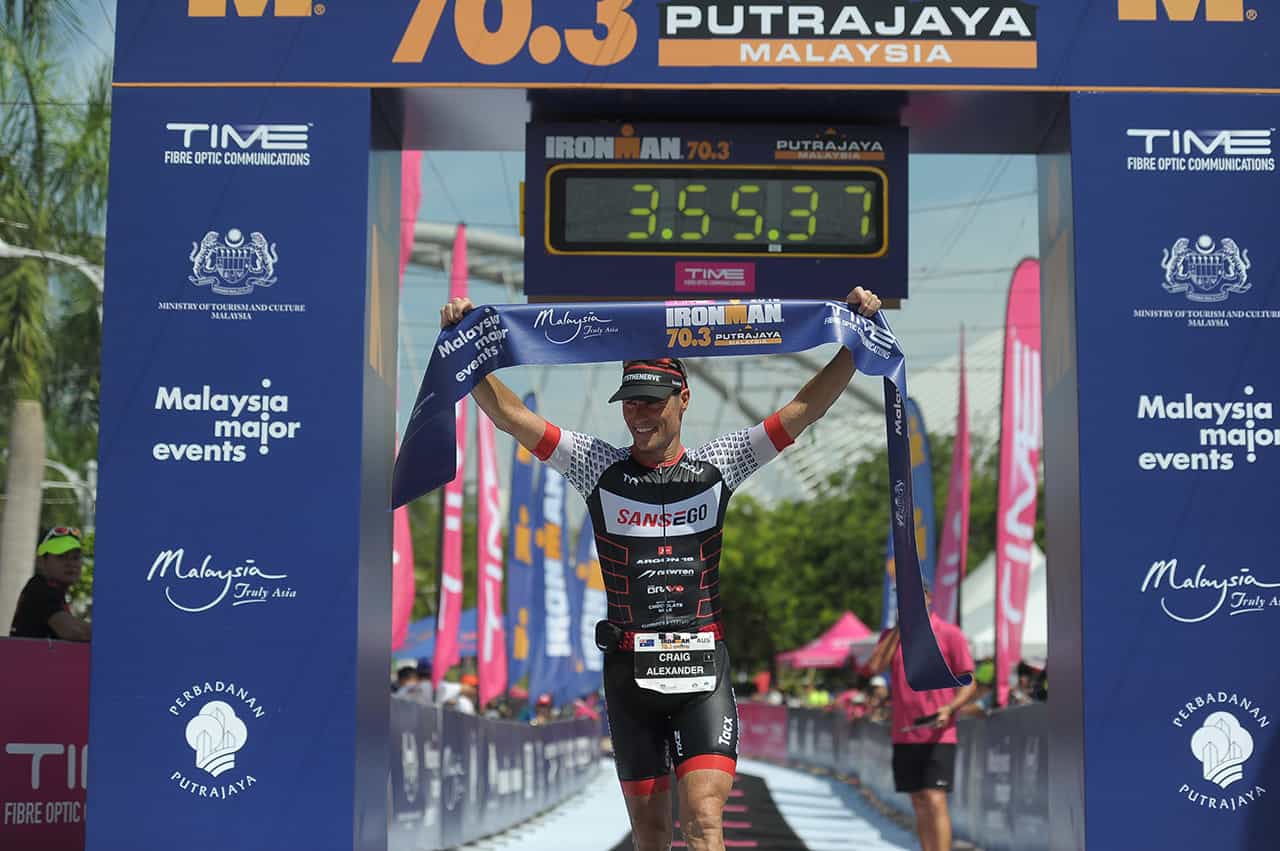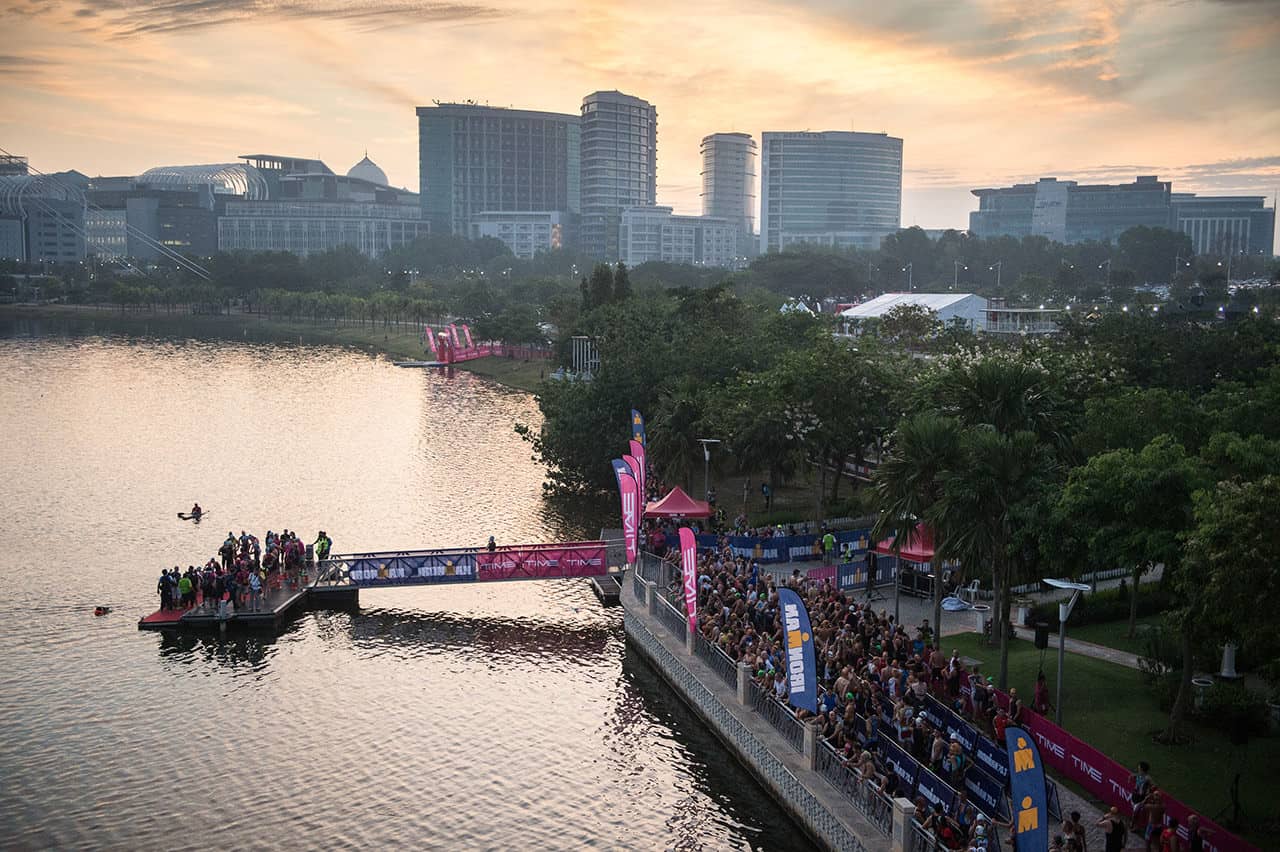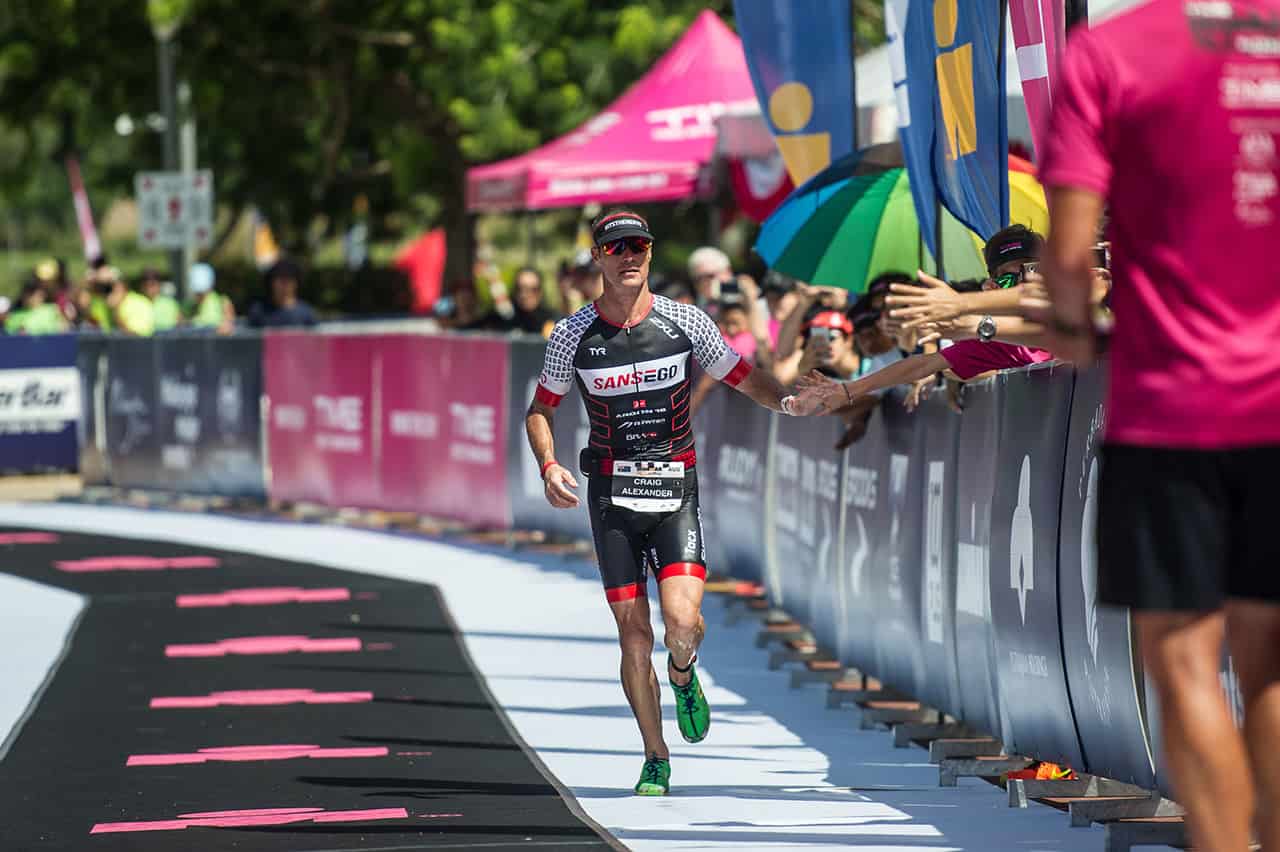“For me racing is about racing the best people at the highest level” Craig Alexander
By Gaël Couturier - Cover shot Sze Ming
Craig Alexander is the last triathlete to win three Ironman World Championship titles in Kona – not to mention the two 70.3 World Championship. With the recent but powerful development of Ironman races in Asia, a Chinese company now owns the brand; Craig does not have to travel the world for months anymore in order to compete at Ironman races. He can stay home in Sydney, Australia, to his wife and kids, and travel closer from home. We’ve met with him end of April at Putrajaya, Malaysia, where he won the 70.3 Ironman, only one week after winning another 70.3, at Subic Bay in the Philippines.
Gaël Couturier: With the current push in the development of Ironman as a brand in the Asia region, I see more and more Australians coming to race there. Here in Malaysia for example, 17% of the participants are from your home country, making you the second nation the most represented, behind the Malaysian themselves. Among the pros, 45% of pro male population and 60% of the women are also from Australia. How do you explain this Australian supremacy in the region?
Craig Alexander: I’ve personally always been spending time racing here in Asia, especially during the summer of our southern hemisphere, which is winter in Europe or USA. I did Singapore a few times when it was on for example but unfortunately the race has disappeared. For a long time, the majority of the Ironman racing happened in the USA, or Europe. It just makes sense to me now that I’ve put an end to my full Ironman career to stay in this Asia-Pacific region more as it’s closer from home. My wife and I, we used to go to Boulder, Colorado, for about 4-5 month in the summer every year. Boulder had great roads for biking, both flat and hilly, great trails for running, a few nice pools for swimming and most of all a great pro triathlete crowd to train with. Then we were heading to Kona for one month. But we don’t do this anymore. Even last year, we were in the USA for only for 4-5 weeks in total. All those Southeast Asian locations, whether it is Malaysia, the Philippines, Korea, Taiwan or Indonesia are such an easy trip up for us. There’s not so much time difference with Australia and because the WTC, owner of Ironman, are now building a stronger network of races in this region, it just makes sense for us to come here more often. You’re right, a lot of my guys are here in Malaysia with me: from Josh Amberger who placed second right behind me, Luke McKenzie, Brad Kahlefeldt, Matthew Pellow, Mitchell Robins… and on the women’s side there’s Liz Blatchford who finished second and Kate Bevilaqua who finished third, Sarah Crowley and Kathryn Haesner who’s from New-Zealand. Pros from other countries also race in Asia more these days. They are mostly European who live in Southeast Asia or in Australia. Radka Vodickova, the young Czech who won this 70.3 Malaysian race for the second consecutive time is an example since she lives in Noosa, Queensland. The Swedish Fredrick Croneborg who lives in Thailand is another one.
Gaël Couturier: You raced for Tri Dubai, in 2006 when you won the inaugural 70.3 World Championship in Clearwater, Florida. Now you have recently become a “pro ambassador” for Ironman in China. What do you think of that new Chinese ownership of such a legendary American brand?
Craig Alexander: Well, I think there are a lot of nice locations in Asia to be discovered, and China, for sure. This new owner has a good history of being involved in entertainment, sport and media. So we can imagine that they are going to be good at growing the sport and promoting it. I think this could be a good thing for triathlon because by putting more races in this Asian region, and China in particular, it will make the sport get bigger and bigger. If we want triathlon to become a global mediatized sport like tennis or golf, we need to show that it can be done anywhere. For a long time, triathlon has mostly been done in North American and Europe, Australia, South Africa and New Zealand. Those days are over because Asia is growing fast and, again, it suits me fine because it’s closer from home.
Gaël Couturier: Since you’re focusing more on 70.3 races now, does that mean you’re going to race at the World Championship in Mooloolaba, Queensland on September 4th? After winning in 2006 and 2011 those 70.3 World Championships, that would be a great opportunity to achieve symmetry between all your World Championship titles…
Craig Alexander: In a perfect world, that would be nice. I’m not against it, for sure. I just love to race. I don’t want to stop. I’ll be 43 years old in June this year and I still love the sport as much as I ever have. I’m also very proud that I can get in shape to continue to win big races. But you know, the motivation can evolve along the years. But for me racing is still about racing the best people and racing at the highest level. It’s a big incentive having the World Championship in Australia this year because for my whole career I had to race everywhere else than home. But I also know that to race a World Championship your focus has to be exactly that. Your focus has to be training and racing. Period. I haven’t raced a World Championship for several years now so it would be hard for me to get back to that kind of required focus. If you look at Sebastian Kienle, Jan Frodeno, Javier Gomez or Swiss Daniela Ryf, triathlon racing is their number one priority.
Sebastian Kienle, 32 years old, German, 70.3 World Champion in 2012 and 2013, Ironman World Champion in 2014. Jan Frodeno, 34 years old, German, Olympic champion in 2008, Ironman World Champion in 2015. Javier Gomez, 33 years old, Spanish, ITU World Champion in 2003, 2008 & 2013, 70.3 World Champion in 2014. Daniela Ryf, 29 years old, Swiss, Ironman World Champion en 2015.
I have 3 children who are older now, I have a little business for coaching also but, that being said, it would be nice, yeah. I don’t know. The race is still a long way around so I could certainly change my focus. I guess it depends on this trip I have to make to America early summer. I think I’m going to be gone for 5 or 6 weeks. A lot of it is promotional, with visiting expos and photo shoots. If I can get good training done when I’m there I’ll certainly think about it. But if the training is not world class, if it’s not very good, then there’s no point.

“A third title in 70.3 World Championship this September in Australia? Sure, that’d be nice. If I can get good training, I’ll certainly think about it. But since I’ll be traveling in the US pretty soon for promotional purposes, if the training is not world class, if it’s not very good, then there’s no point.”
Gaël Couturier: Do you think that your longevity at the highest level of the sport, had something to do with not racing Ironman too early in your career?
Craig Alexander: Yes. Absolutely. And I think it’s also because I didn’t start doing triathlon too early in my life. I only started as a 20-21 years old. That being said, I think these days it would be a lot more difficult to do that because, particularly if you look at 70.3 racing or even ITU racing, a lot of the guys now are much younger. And I think the depth of the sport and the level is much higher than it was 20 years ago. Back then, you could start as a 20 years old and still progress to the point where you become a world champion. That’s what happened to me. Now, you have to start much younger. The sport has evolved; it has become more global and more serious. The reason I’m still going now at 70.3 races is because mentally and physically I’m not burned out, not only because I started so late, in my twenties, but also because I didn’t do my first Ironman until I was 34 years old (Port Macquarie, Australia in 2007).
Gaël Couturier: Most people agree that long distance triathlon is one of the most physically and mentally demanding sport on the planet. Do you think being a dad and an Ironman can set a special kind of example to kids? What about to your kids?
Craig Alexander: Definitely yes, I agree with that. I think triathlon is a sport that requires a lot of focus and discipline and hard work. All those things are by themselves a good example to follow in life. With my wife, we’re very happy that our two oldest can remember all the races I’ve done and all the hard training I’ve dedicated into it, such as how their dad used to get up and train every single day for years. They understand the work. Things can he hard in our sport, sure, but if you focus, if you plan and if you’re willing to work hard, then you can succeed.
Gaël Couturier: “Fight to the death”. I’ve heard you say that before. Do you think anyone can do an Ironman? Can anyone be an age group Ironman finisher?
Craig Alexander: Among all things, being able to finish an Ironman takes physical preparation. Often, on an Olympic distance race, you go as hard as you can and then the race is over. But in an Ironman, there’s a lot of time for things to go wrong during the race, nutrition is one of the main examples that people have trouble with. The difference between an Ironman and a shorter race is that an Ironman race will test you mentally. I believe it is much more of a mental challenge than a physical one. And I think that’s what people want. That mental challenge is what draws people to the sport. You know it’s not easy and you know it’s about a personal journey to be the best athlete you can be while achieving the best preparation, the best training and the best performance you can. You know that it’s also going to test you, not just physically but on your mental side. And you can never quit even when things start to go bad. I mean, it’s very easy to race well when things are doing good. Anyone can do that. But if you look at the history of the sport, the best athletes have always been consistent: Simon Lessing is 4-times ITU World Champion, Mark Allen is 6-times Ironman World Champion, Jan Frodeno has been on the top of his game since 2008. They’re all very consistent. Those guys are individuals who are not having good days every day but, even when they’re having a bad day, they manage to turn it into a good day. That’s the secret. Because that’s what great champions do. When the gun goes off on an Ironman, you have to find a way to succeed. And part of that, to me, is a commitment to not quit. So yeah, fight to the death!
Gaël Couturier: What about a primal, simple, fear? Don’t you think that the Ironman distance can also be very intimidating?
Craig Alexander:
Fear is part of that challenge! Every Ironman that I did there was a little bit of fear, a little bit of uncertainty. But you can guess how hard it’s going to be. You need to accept that as a challenge. I read a good quote the other day that said: “if you only ever do things that you know you’ll be good at or things that you know you can finish, then you’ll never truly challenge yourself”. You can’t just continue to do the same things over and over, sometimes you have to step outside of your comfort zone. I think this what the challenge of Ironman is. It’s such a long way. So many things can go wrong. Just be positive and, well, try. That’s my best advice: have a good plan, be consistent in your training and have a good mental set the whole time. Be positive, don’t get dishearten when things get hard because they are supposed to get hard, that’s what happens on an Ironman.

“It’s very easy to race well when things are doing good. Anyone can do that. But if you look at the history of the sport of triathlon, the best athletes are the consistent ones: Simon Lessing, Mark Allen, Dave Scott, even the young Jan Frodeno... they’re all very consistent. These are individuals who are not having good days everyday but are able to turn any given day into a good day. ”
Gaël Couturier: Is there any human qualities that all pros Ironman triathletes have in common and which would be different than what you can find within pro golfers or pro surfers? Could it just be the ability to endure pain?
Craig Alexander: I think professional in sports all have a dedication and a commitment to be the best they can be. That’s one thing. Obviously, our sport does involve a little bit of injuring and suffering. That’s just part of it. And that’s also part of the attraction to Ironman for people I think. Participants to Ironman races, all want to push themselves a little bit harder and a little bit further than they have ever had before. That’s definitely a common personality trait to the people in our sport, whether they are pros or age groupers. I don’t know if it means that Ironman pro athletes are masochists though but, personally, I was never scared of how much it was going to hurt. In fact, I knew it was going to hurt. I wouldn’t say I enjoyed it but, once again, it was just part of the challenge and I accepted it. I knew that, at some point in the race, usually during the marathon, it was going to be very hard, it was going to hurt like hell, and I would still have to be going for about 2h1/2. To me as much as it can be to lose but it’s never ever ok to not give it all you can to win, to resist that pain. That’s what the Ironman challenge is about. If you don’t have that within yourself, don’t even show up at the start line because you’re in for a big disillusion.
Gaël Couturier: There’s a new generation emerging, athlete like the one you mentioned before. What do you think of them? Are they any different than you when you were their age?
Craig Alexander: Like I said, I think they started a lot younger. And generally speaking they’re just better. They’ve had better coaching. You look at someone like Jan Frodeno, he’s a great product of the German federation. He raced ITU at the top level and he had access to the best training facilities, the best coaches. You generally look at those guys and you can see that their techniques are very good, that they had proper training in the pool or even got gait correction at running. Javier and Jan have indeed beautiful swimming technique and beautiful running forms. This is professionalization, and the level goes up. It’s typical of a sport growing up and getting older. Those guys are not raw talent and hard work anymore. Jan travels with a full time physiotherapist. He’s very, very, professional. And that’s something I see with a lot of those good guys. Sebastian is the same. Javier is the same. They all travel with a full-time coach. I never had a coach. When I first started a lot of people didn’t have coaches. In the mid-90’s, champions used to be above all runners or cyclists. Now they are all being grown up as triathletes. Take Jan on the bike for example: he looks like a professional cyclist. His position looks great, really professional. I have a lot of respect for those guys simply because I think they’re taking our sport to the next level.
Gaël Couturier: Have you ever looked at other sport icons, people who have dominated the sport for a long time, like Kelly Slater in Surfing, Mickael Jordan in Basketball, Tiger Woods in golfing. Who were the champions you looked up to when growing up in the sports?
Craig Alexander: I always looked up to the athletes who showed consistency. Since I grew up playing football I still love Diego Maradona. Then, well the first triathlon I saw was the World Championship in Kona, Hawaii, on television, so obviously when growing up in the sport I looked up to Mark Allen and Dave Scott. I also liked my fellow Australian Greg Welch. He won Kona in 1994 and that was the year I started triathlon. He was amazing to me because he could do it all very well: long course, short distances, Ironman. On the women side I was following Michellie Jones, also from Australia, who won at Kona in 2006 right before Chrissie Wellington started her impressive domination – until another Australian, Mirinda Carfrae, stopped her. Michellie Jones’s consistency was incredible. Every time she raced, you knew how she would perform. He versatility was also incredible: she could do a non-drafting race like the Chicago triathlon in Olympic distance or she could do a ITU race with drafting or she could do a half-Ironman or she could do an Ironman. She could just do it all. Then, aside from the triathlon, there’s Roger Federer. He’s just a classy athlete. He looks amazing on the court, so effortless. And he still plays at the highest level, at 34 years old, with four children, in a sport that is really more for younger men. That’s consistency!

“The first thing for me is consistency. A lot of people can win a race here and there but the athlete who performs every single time for 5 or 10 years in a row at a high level, to me that’s incredible.”
Gaël Couturier: What does Diego Maradona and Craig Alexander have in common?
Craig Alexander: Soccer is based on a lot of skills. You need a lot of skills to play soccer. I know soccer helped me because when I started triathlon at 20 or 21 years old, I was very fit. I played soccer for 14 years and even though it’s more sprinting and agility left and right, you’re still moving for 90 minutes. That’s a great way to build your aerobic engine.
Gaël Couturier: There’s a bit of a controversy still going on with the Ironman World Championship in Kona regarding pro female number of slots. What is your take on that?
Craig Alexander: I don’t have a problem with having equal numbers between men and women but I think it should be 30 men and 30 women. It’s the World Championship and if you’re going to have a qualification system then you have to make it prestigious. 30 is a good enough number. A lot of qualified pros don’t even start or DNF every year. It’s not always the fault of the athlete, some get sick, some get injured, sure. But it almost looks like the WTC is looking for pros to fill the spots reserved for them every year now. It’s ridiculous. I also believe the qualification should be a little different. I think you should have the top 10 in Kona automatically qualified for the following year. Ironman racing is very different than all other ITU races, because of the marathon. In triathlon, there’s only one race really, and that’s Kona. Everybody is there, all the top athletes are there. So if you perform well at Kona, among the best of the best, you should be rewarded. If the whole goal is to make the best people qualify, then the people who perform at Kona are the ones showing that they’re the best. They qualified with all the best people out there. With the current qualification system, a lot of people are doing a lot of Ironman in a year in order to be able to qualify and I don’t agree with that. You can only really do one of two Ironman without starting to hurt your body, especially if you want to have a long career in the sport. No doubt that anyone can get away with 2 or 3 Ironman a year but if you want to last, if you want to have some longevity you can’t do that many. It’s not only about the muscles and bones getting pounded, it’s about your entire immune system getting overworked. Look at the elite marathoners: they only do one or two a year.
Gaël Couturier: What is the best advice you have ever received?
Craig Alexander: Don’t try to do everything in one day or one week. Have a plan, stick to it, get as much advice as you can from respected people but ultimately, be in control of your own plan…and try consistently.
Gaël Couturier: What is the worst mistake you’ve ever made?
Craig Alexander: try to do the same thing every year: train the same and race the same. Athletes can be tricked into habits and they can get used of doing things a certain way but they shouldn’t be scared to change things up a little bit, particularly as you get older. You’re very good at an endurance sport when you’re 30 or 35 but your body definitely changes after you’re 37 or 38. So you’re getting used to doing things the same way year after year because your body is the same years after years. But after 37-38, your body changed so you have to make changes as well.

